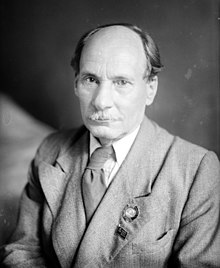You can help expand this article with text translated from the corresponding article in Belarusian. (May 2023) Click [show] for important translation instructions.
|
Yakub Kolas Якуб Колас | |
|---|---|
 | |
| Born | Kanstantsin Mihaylavich Mitskievich November 3 [O.S. October 22] 1882 Akinchytsy, Minsk Governorate, Russian Empire |
| Died | August 13, 1956 (aged 73) Minsk, Byelorussian SSR, Soviet Union |
| Occupation | Writer, dramatist, poet, translator |
| Nationality | Belarusian |
| Period | 1906–1956 |
Yakub Kolas (also Jakub Kołas, Belarusian: Яку́б Ко́лас, November 3 [O.S. October 22] 1882 – August 13, 1956), real name Kanstantsin Mikhailovich Mitskievich (Канстанці́н Міха́йлавіч Міцке́віч, Russian: Константи́н Миха́йлович Мицке́вич, Polish: Konstanty Mickiewicz) was a Belarusian writer, dramatist, poet and translator. People's Poet of the Byelorussian SSR (1926), member (1928) and vice-president (from 1929) of the Belarusian Academy of Sciences.[1]
In his works, Yakub Kolas was known for his sympathy towards the ordinary Belarusian peasantry. This was evident in his pen name 'Kolas', meaning 'ear of grain' in Belarusian. He wrote collections of poems Songs of Captivity (Russian: Песни неволи, 1908) and Songs of Grief (Belarusian: Песьні-жальбы, 1910), poems A New Land (Belarusian: Новая зямля, 1923) and Simon the Musician (Belarusian: Сымон-музыка, 1925), stories, and plays. His poem The Fisherman's Hut (Belarusian: Рыбакова хата, 1947) is about the fight after unification of Belarus with the Soviet state. His trilogy At a Crossroads (Russian: На перепутье, 1925) is about the pre-Revolutionary life of the Belarusian peasantry and the democratic intelligentsia. He was awarded the Stalin Prize in 1946 and 1949.[1]